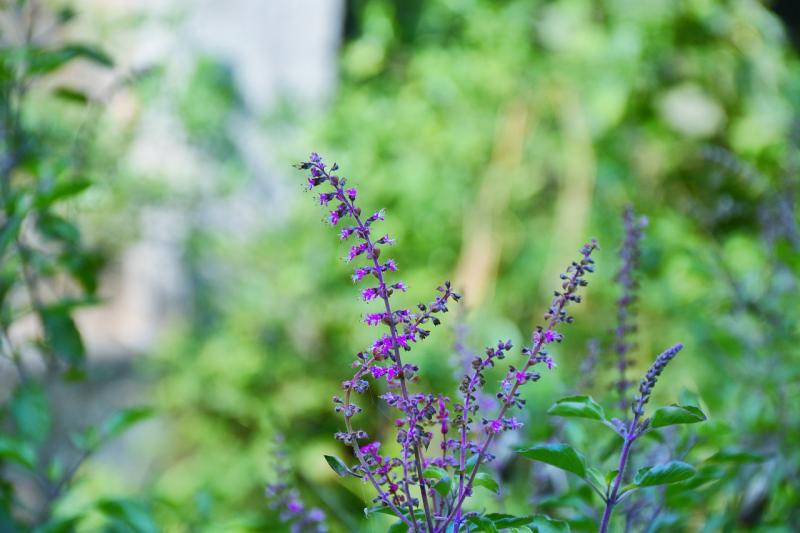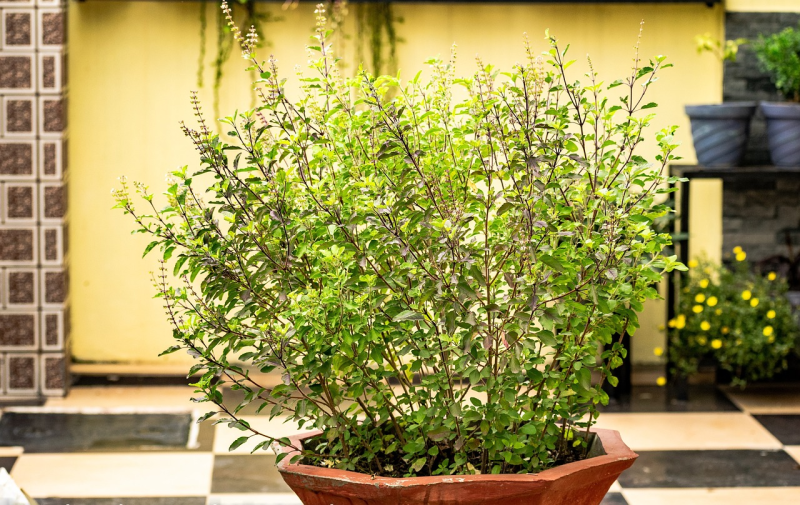These Tulsi tree green leaves are widely consumed uncooked in India to treat coughs and colds. Basil has traditionally been a staple in every household due to its vast benefits. As a result, the plant plays an important role in Indian rituals. There are different types of tulsi plant like Rama Tulsi, krishna tulsi plant and vana Tulsi etc., available with various benefits.

The key oil extracted from basil is utilized in the cosmetic industry to make lotions, soaps, perfumes, and shampoos.
The sacred herb contains nutrients A, C, and K, as well as minerals like calcium, iron, magnesium, and potassium. It contains a significant amount of protein and fibre, both of which are essential for peak fitness. Tulsi leaves are a natural way to treat and rescue you from a wide range of illnesses.
Consuming tulsi plant leaves protects organs and tissues from chemical and biological stress caused by prolonged physical activity, ischemia, physical constraint, and exposure to bloodless and loud noises. Commercial pollutants and heavy metals cause chemical strain.
Important aspects of Tulsi
Tulsi leaves can affect male and female fertility.
In an animal study published in the International Journal of Ayurveda Research in 2010, it was established that tulsi should decrease sperm motility and be counted in animals when consumed in large quantities.
Even though the herb has not yet been evaluated in humans, it is wise for adult males who have infertility to avoid this negative effect by limiting their consumption of it.
Protects liver
Eugenol is a compound found in tulsi. Eugenol can protect the liver against environmental damage, but in excess, it can cause vomiting, diarrhoea, a rapid heartbeat, and convulsions.
Lowers blood sugar levels
Tulsi is known for lowering blood sugar levels. However, if a person is already taking diabetes medication, consuming tulsi leaves may increase the effect and cause the sugar level to drop too low.
Harmful to those taking blood thinners
The tulsi plant is thought to have blood-thinning properties. Tulsi is an excellent alternative for people who choose not to take blood thinners. However, eating tulsi while taking blood thinners can have a negative impact on one’s fitness. People who use anti-clotting medications must avoid basil leaf consumption.
Pregnancy
Tulsi leaves may affect the health of a pregnant girl and her unborn kid. In severe cases, it can cause miscarriage. The plant may also induce potentially dangerous uterine contractions.
Tulsi should stimulate blood flow to the pelvis and uterus, potentially leading to contractions. Nonetheless, there are insufficient facts to support or condemn the use of tulsi during pregnancy. To be on the safe side, professionals advise women to avoid consuming tulsi.
Nausea
A scientific investigation identified temporary moderate nausea as a side effect of tulsi consumption. The thirteen-week trial ended with unsatisfactory results, but this does not rule out the possibility of long-term repercussions.
Nonetheless, the traditional history of tulsi use implies that any significant long-term effects are uncommon and that daily consumption can be safe. However, this needs to be demonstrated through additional research.
Damages teeth
Someone could advocate swallowing tulsi leaves rather than chewing them. The identical has a scientific basis. Tulsi leaves should not be chewed since they contain mercury, which can injure the teeth.
Tulsi contains mercury, which, when chewed, releases into the mouth and destroys and discolours the enamel. Furthermore, tulsi leaves are acidic by nature, while the mouth is alkaline, which may accelerate the breakdown of dental enamel.
To prevent tooth discolouration, simply swallow them down.
How to take Tulsi?
Here are some safe methods to consume tulsi.
- Options for tulsi include tea, ghee or honey, juice, and water.
- Tulsi leaves can be added to tea immediately and drunk frequently.
- Tulsi tea is ideal because it provides numerous health benefits.
Tips for managing your lifestyle well with Tulsi

- Tulasi has no negative side effects in human clinical trials. People who are nursing, pregnant, or trying to conceive should avoid using holy basil.
- It is not always clear whether Tulsi is suitable for toddlers, children, pregnant women, or nursing mothers. However, there is a chance that Tulsi will impact a woman’s ability to conceive.
- Tulsi tea may cause nausea and diarrhea when consumed for the first time or when added to a diet. Begin with moderate amounts and gradually increase.
- Tulsi can lower blood sugar levels but should be consumed with caution if on diabetes treatment.
Take precautions.
Seek scientific advice before ingesting Tulsi to avoid side effects. Special care should be provided for children, the elderly, pregnant women, and nursing mothers.
In conclusion, holy basil, also known as tulsi or Ocimum sanctum, is used in Ayurvedic medicine as an adaptogen plant to treat different diseases, particularly those caused by stress. Tulsi leaves have numerous clinical benefits. They promote the healthy functioning of the body’s organs, including the liver, kidneys, and heart. You can get tulsi tree online with various online plant selling websites.
Holy basil plant also aid in relaxing and relieving tension by soothing the mind. Thus, consuming two to three tulsi leaves per day may work miracles and improve human fitness. Consult a healthcare professional before adding holy basil or other supplements to your diet. The FDA does not regulate the quality, purity, or efficacy of Tulsi-derived dietary supplements and herbs. Therefore, growing holy basil at home is perfectly acceptable. Otherwise, look for organically cultivated Tulsi in a clean, rural area. When basil is cultivated in a polluted environment, it becomes significantly more harmful.
FAQs
Can we consume tulsi water every day?
- Tulsi tea, when consumed daily, has a relaxing effect and decreases blood pressure.
- Tulsi is recommended as an Ayurvedic resource for reducing asthmatic symptoms due to its capacity to balance Kapha.
- Tulsi can also help treat ringworm.
Which tulsi is best for fitness?
All kinds of tulsi have significant fitness benefits. Kapoor tulsi, Krishna tulsi, and holy basil are distinct varieties that are thought to heal a variety of minor and serious illnesses.
How many tulsi leaves can be consumed in the afternoon?
Consuming five to seven raw fresh tulsi leaves per day is ideal, particularly when consumed early in the morning.
What disorders does Tulsi treat?
Tulsi can be used to treat common colds, flu, fever, allergies, high blood pressure, diabetes, coronary heart disease, malaria, liver illness, diarrhea, and sleeplessness.
Who should not take Tulsi?
People who have diabetes, hypothyroidism, or are currently using blood thinners should avoid Tulsi. Though tulsi is extremely safe, pregnant women should use caution when ingesting it; avoidance is advised.

